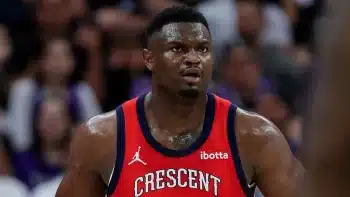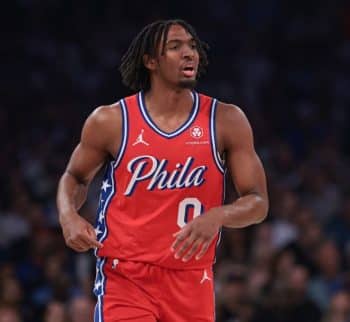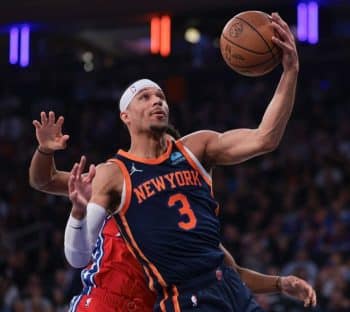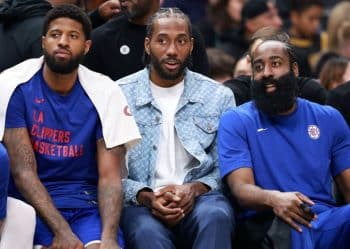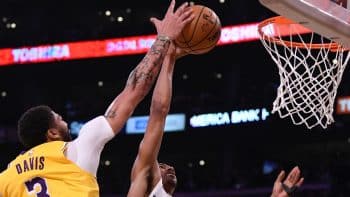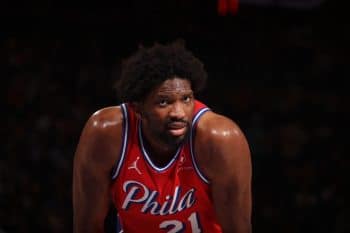NBA
2015 NBA Draft Order a Complex Puzzle

Last week, the NBA broke four ties to help establish the order for the 2015 NBA Draft.
The Indiana Pacers, Dallas Mavericks, Memphis Grizzlies and Houston Rockets proved victorious, although the Houston win benefits the Los Angeles Lakers, who will get the Rockets’ 27th pick as part of last summer’s Jeremy Lin trade.
Teams often use future draft picks as currency, in an increasingly complex web of obligations. Six of the 30 first-round picks in June’s draft, along with two second-rounders, are still unresolved.
The Philadelphia 76ers won’t know if they have one, two or three first-rounders until the May 19 draft lottery.
If the Lakers (fourth seeded in the lottery) don’t land a top-five selection, the pick will go to the Sixers this year (a 17.2 percent chance) – otherwise it’ll go the following year with top-three protection.
Philadelphia acquired the Lakers’ pick from the Phoenix Suns in the Brandon Knight/Michael Carter-Williams deal. The Suns got it from the Lakers for Steve Nash.
The Sixers will also get Miami’s first-rounder if the HEAT fall at least one spot from 10th overall (9.1 percent chance). Miami traded the pick for LeBron James, and the Sixers landed it in exchange for Thaddeus Young. If the Sixers don’t get it this year, the pick will also be top-10 protected in 2016.
Merely a formality, the Atlanta Hawks (29th) have the right to swap first-rounders with the Brooklyn Nets (15th), from the Joe Johnson deal. Via the Luol Deng trade, the Chicago Bulls (22nd) can similarly swap with the Cleveland Cavaliers (24th), but they obviously wouldn’t choose to drop two slots.
Finally, if the Indiana Pacers finish with a higher first-rounder than the Utah Jazz after the draft lottery, they’ll get the lower (43rd pick) in the second, with the Jazz getting 42nd.
A few other selections will change hands as well. The New Orleans Pelican’s 18th pick goes to the Rockets for Omer Asik. The Los Angeles Clippers give up their 28th pick to the Boston Celtics in the deal that got head coach Doc Rivers out of his contract with the Celtics.
The second round has even more movement. The New York Knicks’ 32nd goes to Houston, the Sacramento Kings’ 36th is off to the Minnesota Timberwolves, the Toronto Raptors’ 50th conveys to the Atlanta Hawks, the Chicago Bulls’ 51st goes to the Orlando Magic, the Portland Trail Blazers’ 53rd goes to the Cavaliers, Cleveland’s 54th goes to the Utah Jazz, the Memphis Grizzlies’ 56th goes to New Orleans and the Clippers’ 57th goes to the Denver Nuggets.
In addition to the Sixers’ potential first-round haul, the team will also receive Orlando’s 35th pick, the Nuggets’ 37th pick, the Pelicans’ 47th pick, the Rockets’ 58th pick and the Golden State Warriors’ 60th pick. Philadelphia owes its own 33rd selection to the Celtics. In the unlikely event that the lottery bumps both the Lakers and HEAT, the 76ers would have eight draft picks in June.
A number of protections kicked in to delay first-round swaps, including the Timberwolves’ obligation to the Celtics, which is also top-12 protected in 2016. The Sixers will no longer owe Boston a first (for the Arnett Moultrie and Joel Anthony deals), but their 2015 and 2016 second-rounder instead.
Philadelphia will also get the Oklahoma City Thunder 2016 first (top-15 protected), after the Thunder’s current top-18 protection kicked.
The Mavericks’ first-rounder would also have gone to Boston this June, had the Mavericks finished in the four to 14 range. Instead, it will be top-seven protected next summer.
The Bulls didn’t get the Kings’ first rounder, which is top-10 protected through 2017. The Grizzlies still owe the Nuggets a first, with both top-five and 15-30 protection next season as well.
The notion of draft reform has been explored by the NBA, but the owners have no consensus replacement plan in place, so for now the league will continue to stick with the current system.
With the various permutations of credits and obligations, it may be too complicated for the league to make any changes in the near future.
